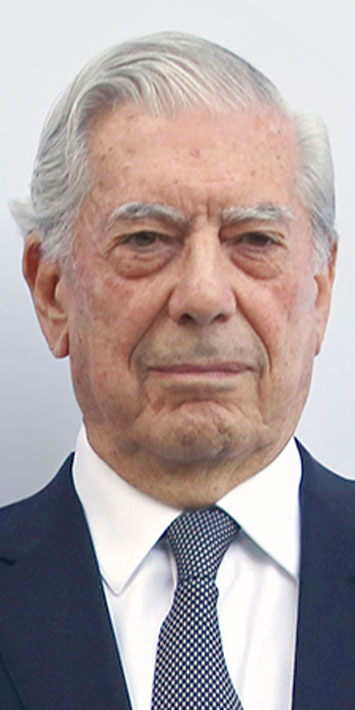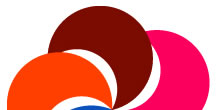Home > Learning resources > Spanish Literature > Mario Vargas Llosa
Mario Vargas LLosa

Biografía
Mario Vargas Llosa nació en una familia de clase media en 1936 en Arequipa, la segunda ciudad más grande de Perú. Cuando todavía era muy pequeño, los padres de Vargas Llosa se divorciaron y él se mudó a Cochabamba, Bolivia con sus abuelos maternos. Su madre le ocultó la verdad sobre la separación contándole que su padre había muerto, hasta que un día, en 1946, su padre apareció inesperadamente y se llevó a Mario con él. Esta abrupta revelación ejerció una gran influencia en su obra posterior. La vida junto a su padre le hizo descubrir un mundo más duro definido por el autoritarismo, el miedo, la injusticia y la violencia. Durante este periodo, empezó a leer a Dumas y Víctor Hugo, y comenzó sus estudios de leyes y literatura en Lima. Antes de terminar la universidad ya había iniciado su carrera literaria con la publicación de sus primeras historias cortas, “Los jefes” y “El abuelo”, al tiempo que trabajaba en dos periódicos peruanos.
En 1963, publicó su primera novela, “La ciudad y los perros” con una gran acogida. Traducida en más de doce idiomas, describía los esfuerzos de la vida adolecente por sobrevivir en un entorno hostil y violento. Durante algunos años vivió y trabajó en distintas ciudades europeas y comenzó a dar conferencias por todo el mundo.
Siempre rodeado de una intensa actividad política y comprometido con la ideología política, en 1990 presentó su candidatura para la presidencia de Perú, pero perdió contra Alberto Fujimori. Pocos años después, fue galardonado con el premio Cervantes, el galardón más importante de la literatura española. Las numerosas publicaciones posteriores le convirtieron gradualmente en un autor de gran reconocimiento. Hoy, Mario Vargas Llosa es considerado como uno de los principales escritores de Latinoamérica y se le reconoce entre los que más han promovido la literatura.
En 2010 recibió su mayor premio, el Novel de Literatura “Por su cartografía de las estructuras del poder y sus mordaces imágenes de la resistencia individual, la revuelta y la derrota".
Biography
Mario Vargas Llosa was born to a middle-class family in 1936 in Arequipa, Peru’s second largest city. While he was still an infant Vargas Llosa’s parents divorced and he moved to Cochabamba, Bolivia, with his maternal grandparents. His mother hid the truth about their separation telling Mario that his father had died. But the abrupt revelation emerged one day in 1946 when his father appeared and took him away with him. This episode influenced his life strongly. Life with his father made him discover a tougher world of authoritarianism, fear, injustice and violence. During this time, he started reading Dumas and Victor Hugo and began his studies of law and literature. Before finishing school he had already started his literary career with the publication of his first short stories, "The Leaders" and "The Grandfather", while working for two Peruvian newspapers.
In 1963, he published his first novel, “The City and the Dogs”, to wide acclaim. Translated into more than a dozen languages, it described adolescents striving for survival in a hostile and violent environment. For some years, he lived and worked in Europe and started lecturing throughout the world.
Always surrounded by intense political activity and engaged in political ideology, in 1990 he presented his candidacy to run for President in Peru, but lost against Alberto Fujimori. A few years later, he was awarded the Cervantes prize, the most important accolade in Spanish-language literature. Numerous publications followed gradually making him a well-recognized and solid author. Today, Mario Vargas Llosa is considered among the major Latin American writers and is recognized as one of those who have most consciously promoted literature.
In 2010 he received his biggest award, the Nobel Prize of Literature "for his cartography of structures of power and his trenchant images of the individual's resistance, revolt, and defeat".
Estilo
Escritor, periodista, ensayista, político, Vargas Llosa ha escrito más de treinta obras de ficción, obras de teatro y novelas en diferentes géneros literarios. Su estilo incluye tanto material histórico como de su propia experiencia personal. Uno de sus temas principales ha sido el de la lucha del individuo por la libertad en una realidad opresiva.
Entre sus obras más destacadas se encuentran: “El hablador”, “Elogio de la madrastra”, “La ciudad y los perros”, “La casa verde”, “Conversación en la catedral”, “Lituma en los Andes”, “Los cuadernos de Don Rigoberto”, “La fiesta del chivo”, “El paraíso en la otra esquina”, “Travesuras de la niña mala” y “El sueño del celta”.
Style
Writer, journalist, essayist, politician, Vargas Llosa has written more than thirty works of nonfiction, plays and novels across many different literary genres. His style includes as much historical material as his own personal experience. One of his main themes has been the individual's struggle for freedom within an oppressive reality.
Some of the most notable works of Mario Vargas Llosa include “The Storyteller”, “In praise of the Stepmother”, “The Time of the Hero”, “The Green House”, “Conversation in the Cathedral”, “Death in the Andes”, “Notebooks of Don Rigoberto”, “The Feast of the Goat”, “The Way to Paradise”, “The Bad Girl” and “The Dream of the Celt”.
Recommended books
As an Amazon Associate we earn commisions from qualifying purchases made through links in this page.
La Guerra Del Fin Del Mundo La Guerra del Fin del Mundo, la primera novela que Mario Vargas Llosa situó fuera del Perú, es un prodigio de expresión de mentalidades profundas, de pasiones irracionales y desbocadas fuerzas sociales. Un trama político-militar se articula para detener con toda su fuerza un movimiento que amenaza con expandirse. Un relato exhaustivamente documentado, tanto a través de lecturas como de viajes sobre el terreno en que tuvo lugar este acontecimiento histórico. Un libro fundamental en la literatura del siglo XX. Deep within the remote backlands of 19th-century Brazil sits Canudosa libertarian paradise. Home of prostitutes, bandits, beggars, Canudos embodies the revolutionary spirit in its purest and most apocalyptic form. In La Guerra del Fin del Mundo, one of his most brilliant and tragic novels, Mario Vargas Llosa creates an unforgettable tale of passion, idealism, adventure, and man's struggle to be free. |
La Ciudad y Los Perros La ciudad y los Perros" es la primera novela de MVLL, con la cual ganaría, en 1964, el premio Biblioteca Breve otorgado por Seix Barral. La publicación del libro provocó reacciones enardecidas en la cúpula militar peruana, quienes en un acto de represalia hicieron una fogata con todas las primeras ediciones que llegaron a sus manos. Esta fue la primera señal que indicaba el nacimiento de un nuevo escritor. La historia se desenvuelve dentro de un colegio militarizado (el Leoncio Prado) y narra de manera cruda las vicisitudes de un grupo de adolescentes que llegaron a ese colegio por diversos motivos. Unos para reformarse y convertirse en hombres de bien, y otros para hacerse "machos". Translated into 30 languages, La Ciudad y los Perros is a basic book in contemporary Latin American fiction. Through the brutality prevailing in a military school in Peru, author Mario Vargas Llosa attacks military education and an outdated concept of manleness. |
La Fiesta del Chivo 'La fiesta del chivo' es varios textos al mismo tiempo. Por un lado, es una cronica ficcionalizada del ultimo dia de la vida de Rafael Leonidas Trujillo, el cruel dictador que goberno a la Republica Dominicana durante 31 anos hasta que fue matado (o ajusticiado) en 1961, y de la terrible represion y habiles manipulaciones politicas de Joaquin Balaguer (el 'miura' de la novela, segun el mismo Vargas Llosa) que siguieron a los hechos; por otro, es una historia, tambien ficcionalizada, del trujillato a traves de diversas voces de allegados al dictador. Mario Vargas Llosa's novel "La Fiesta del Chivo" (The Goat's Feast), recounts the story of General Trujillo's tyrannical dictatorship in the Dominican Republic during the 1960s and the life of a woman named Urania Cabral. Trujillo, nicknamed "El Chivo" (The Goat), nearly destroyed an entire country through his gruesome ways. |
Other books written by Mario Vargas Llosa that you may enjoy!
More Spanish Learning Resources






